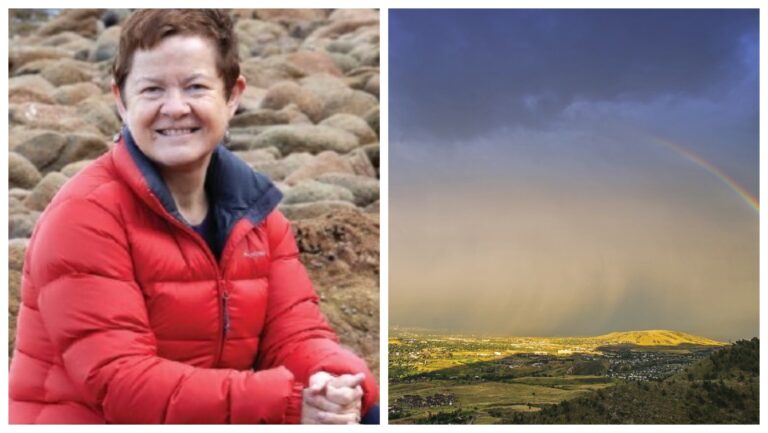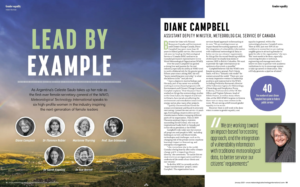In 2022 Dr Sue Barrell was named Laureate of the International Meteorological Organization (IMO) Prize for her leadership in the international weather, water and climate community and for a career of commitment to the WMO. The prize (named after the WMO’s predecessor, the IMO) came four years after she officially retired from her role as chief scientist at the Bureau of Meteorology (BoM) in Australia – an organization she was part of for 38 years.
Starting as a graduate meteorologist at BoM, Dr Barrell had a distinguished career spanning operational forecasting, research, science, climate, infrastructure and data policy, retiring from her final role as BoM chief scientist, with responsibility for research, international and national science relationships, innovation, STEM, diversity and inclusion, in 2018.
“I also represented Australia and led high-level activities at the WMO, the UN Framework Convention on Climate Change [UNFCCC] and the intergovernmental Group on Earth Observations [GEO],” she says.
It was her involvement with the WMO that led to one of her proudest career achievements. “My engagement with the WMO started as I was initiating the redesign of BoM’s observing system strategy, and I became actively engaged in the development of the WMO Integrated Global Observing System [WIGOS] concept, going on to lead that process, through to its adoption and implementation, as the vice president of the Commission for Basic Systems,” she explains.
“As we started to better understand the implications of integrated Earth system data across surface and space-based systems and all domains, as well as the growing requirements and opportunities of NWP, data policy became a more visible issue. I led initiatives first at the Bureau and then at the WMO to better articulate the need for national and international data coordination and exchange. Ultimately this culminated in the 2021 congress approval of the WMO Unified Data Policy, which was a significant achievement that I share with many others,” Dr Barrell adds.
Following her retirement in 2018, Dr Barrell continued to work with the WMO on various projects, which focused on data policy and polar and high mountains, but over the past year she has relinquished responsibility. “My focus has now moved more to roles in Australia, with a special focus on research infrastructure and data. They span some exciting and diverse science challenges including deep oceans, the impact of climate change on coral reefs, and the search for dark matter – from 1km underground in a gold mine!”
Looking at what she believes the future holds for the met sector in general, Dr Barrell says, “Technological developments will never stop, from miniaturized sensors to AI, adding value to the information and services delivered. The pace of these changes brings risks as well, and it is critical for industry bodies, the WMO and national agencies to monitor and assess the risk, impact, benefit, cost, equity, ethics, etc of changes in the context of the need being met, the standards being applied and the genuine value being delivered.”
Dr Barrell notes that throughout her whole career in the meteorological sector she has always “been treated with respect” despite sometimes being the only female in the room. “The gender equality challenges lie not just within the industry, but also in having the right policies and practices in place to source, employ and retain qualified women, and in the feeder pool itself, getting greater diversity into STEM education streams. The latter needs to start in school; university is too late,” she explains.
This article originally appeared in the January 2024 issue of Meteorological Technology International. To view the magazine in full, click here.




